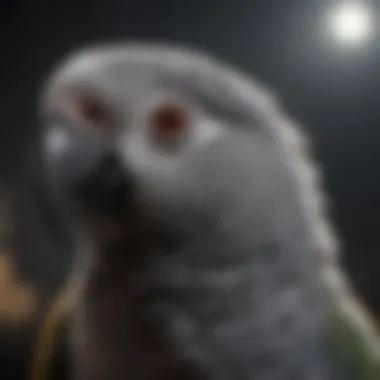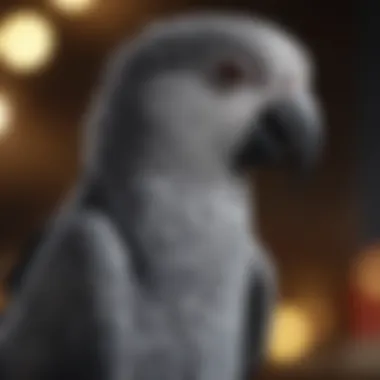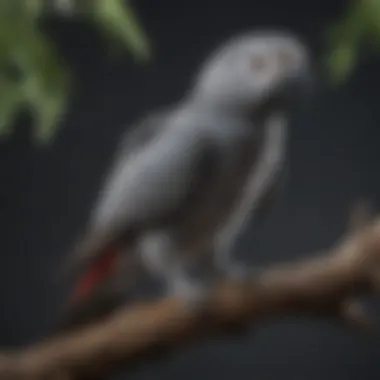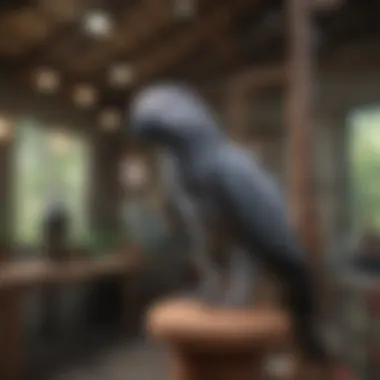Understanding the Price of African Grey Parrots


Intro
The decision to bring an African Grey parrot into your life is one that carries significant implications, both emotionally and financially. Choosing an African Grey is not merely a matter of purchasing a pet, but rather an investment in the companionship of a highly intelligent and socially complex creature. Understanding the multifaceted costs associated with their care is crucial for prospective owners.
African Grey parrots, known for their exceptional cognitive abilities and vocal skills, vary in price. The price of acquiring one can be influenced by various factors, including species variation, age, and locality. Beyond the initial cost of purchase, ongoing expenses such as food, healthcare, and cage maintenance can accumulate quickly. This article aims to equip potential bird owners with the necessary insights about what owning an African Grey entails.
Care Tips
Caring for an African Grey parrot is a multifaceted journey that combines daily routines, proper habitat conditions, and attention to health and hygiene. Here are some key areas to focus on:
Daily Care Routines
Maintaining a consistent daily routine is crucial for the well-being of your African Grey. These birds thrive on structure and predictability. This includes:
- Regular feeding schedules, ensuring a balanced diet.
- Daily interaction and playtime, crucial for their social needs.
- Time out of their cage for exercise.
Cage Setup and Maintenance
An appropriate cage environment is vital. This should include:
- Enough space to move around comfortably.
- Safe and non-toxic materials.
- Regular cleaning to maintain hygiene and prevent illness.
Proper maintenance of the cage includes daily checks for wear and tear, as well as complete cleanings weekly. A clean environment reduces the risk of infections and promotes overall health.
Hygiene and Cleaning Practices
Maintaining hygiene is an ongoing task. Here are basic practices to implement:
- Change water daily to ensure freshness.
- Clean food dishes thoroughly.
- Spot clean any waste or food debris immediately.
Seasonal Care Adjustments
As seasons change, so too should care practices. For example:
- In colder months, ensure the parrot is kept warm, especially at night.
- In hotter months, monitor for signs of overheating.
Behavioral Insights
Understanding the behavioral patterns of African Grey parrots is essential for fostering a healthy, enriching environment.
Understanding Bird Body Language
Learning to read the body language of your bird can reveal its emotions. Signs such as feather fluffing or beak grinding can indicate contentment or stress.
Common Behavioral Issues and Solutions
Behavioral issues such as feather plucking or excessive screaming can arise from stress or boredom. Solutions typically involve:
- Increasing interactive playtime.
- Providing a variety of toys.
Positive Reinforcement Techniques
Using positive reinforcement is an effective training method. This may involve:
- Offering treats for desirable behaviors.
- Verbal praise or gentle petting as rewards.
Social Interaction Needs
African Grey parrots are social birds and require ample interaction, either with human companions or other birds to stay mentally stimulated.
Nutrition Guides
An appropriate diet is fundamental to the health of your African Grey. Here are some considerations:
Essential Diet Components
The diet should consist of:
- Pellets specifically made for African Greys.
- Fresh fruits and vegetables, such as apples and broccoli.
Safe and Toxic Foods
Awareness of toxic foods is necessary. Avoid:


- Avocado, which is highly toxic.
- Chocolate and caffeine products as well.
Supplements and Treats
Offering nutritional supplements can contribute positively to their health. Additionally, occasional treats can help foster a bond but should be given sparingly.
Feeding Strategies for Different Species
Different subspecies may have slightly varying dietary needs, thus researching the specific needs of your specific African Grey is beneficial.
Wellness and Health
Ensuring the health of your African Grey requires diligence and regular attention.
Routine Health Checkups
Regular vet visits are essential to catch potential issues early. It's recommended to establish a relationship with a veterinarian experienced in avian medicine.
Identifying Symptoms of Illness
Mild changes in behavior or appetite can be indicators of illness. It's crucial to watch for:
- Changes in droppings.
- Signs of lethargy or disinterest in play.
Preventative Care and Vaccinations
Stay informed about vaccinations and preventative care practices to help avert diseases common in birds.
Mental and Emotional Well-being
A stressed bird can develop health issues. Enriching environments and social interactions assist in maintaining mental health.
Enriching Activities
Providing stimulating activities contributes significantly to your African Grey’s happiness and health.
Toys and Playtime Ideas
Toys should be rotated regularly to keep them engaging. Options can include:
- Chew toys made from natural materials.
- Puzzle toys that challenge their intellect.
Training and Tricks
Teaching tricks promotes bonding and mental stimulation. Start with simple commands, gradually increasing difficulty.
Outdoor Activities and Interaction
Supervised outings can provide fresh air and new experiences. Use harnesses designed for birds to ensure safety.
DIY Projects for Mental Stimulation
Creating simple DIY toys or puzzles can be rewarding. Such activities engage their natural curiosity and problem-solving skills.
Bringing an African Grey into your home is not just about the monetary investment but about investing time, love, and effort for a fulfilling companionship.
This knowledge equips potential owners with the necessary tools to make informed choices, ensuring a fruitful relationship with their feathered friends.
Prelude to African Grey Parrots
African Grey parrots are remarkable creatures, well-known for their intelligence and distinctive abilities. Their appeal to pet owners lies not only in their captivating personalities but also in their potential for deep social connections. This section aims to outline their unique characteristics and behaviors, providing foundational knowledge for those considering an African Grey as a pet.
Characteristics and Behavior
African Grey parrots display a variety of physical and behavioral traits that set them apart from other bird species. They are medium-sized birds, typically ranging from 12 to 14 inches in total length. Their plumage is primarily grey, with striking red or crimson tail feathers. This vibrant coloration captures the attention of bird enthusiasts and casual observers alike.
Behaviorally, these parrots are known for their exceptional mimicry skills. They can imitate human speech, as well as environmental sounds, which can range from doorbells to phone ringtones. Their cognitive abilities are impressive; they can solve puzzles and learn tasks with relative ease. Social interaction is critical for African Grey parrots; they thrive on engagement and can develop strong bonds with their human companions.
Overall, understanding these specific characteristics is crucial for prospective owners. An informed approach to their behavior and needs can significantly enhance both the parrot's and the owner's experience.
Why They Are Popular Pets
African Grey parrots have garnered popularity in the pet trade for various reasons. Firstly, their intelligence makes them challenging and engaging companions. Many pet owners find joy in training their African Grey, thus facilitating a rich and dynamic relationship.
Secondly, due to their social nature, African Greys tend to be affectionate and even form emotional attachments to their owners. This bond makes them more than just pets; they become integral members of the family. Furthermore, they exhibit a playful personality which can lift the spirits of any household.


However, their popularity brings along responsibilities. Their intelligence requires mental stimulation and regular social interaction. A lack of adequate care can lead to behavioral issues, showcasing the need for a balanced understanding of their characteristics before making a commitment to ownership.
"Owning an African Grey parrot is a long-term commitment that demands dedication and love."
In summary, it is essential to recognize what makes African Grey parrots appealing as pets. Their unique blend of intelligence, behavior, and social need highlights the commitment required for successful ownership.
Factors Influencing the Price
Understanding the various factors that influence the price of an African Grey parrot is crucial for anyone considering adding this intelligent bird to their life. Knowing these elements aids potential owners in making informed decisions about their purchase. It is not only about the initial buying cost but also understanding what contributes to that price.
Several factors contribute to how much one might pay for an African Grey. Potential owners need to consider species variation, the age of the parrot, the reputation of the breeder, and the current market availability and demand. All these elements intertwine, making the price of African Grey parrots subject to fluctuations and different considerations.
Species Variation
African Grey parrots mainly consist of two species: the Congo African Grey and the Timneh African Grey. These species vary in characteristics, size, and coloring. The Congo African Grey is larger, has a striking red tail, and is known for its exceptional talking ability. Meanwhile, the Timneh African Grey, a bit smaller, showcases a maroon tail and is often considered slightly less expensive.
This species distinction plays a significant role in pricing. For example, Congo African Greys are usually priced higher due to their popularity and unique traits. Potential owners must research these differences when budgeting for their new pet. Understanding the specific traits of each species helps clarify which parrot aligns better with their preferences and financial capabilities.
Age of the Parrot
Age is another significant factor that influences price. Younger parrots, typically chicks, are often more expensive than older ones. This is due to the demand for training and bonding time that is easier with younger birds. Baby African Greys require more attention, so breeders may charge a premium for them.
On the other hand, older parrots may come at a lower price. However, they may also come with established behaviors and potential health concerns, which could lead to additional expenses in the long term. Knowing the advantages and disadvantages of different ages helps potential owners decide what fits best with their lifestyle and budget.
Breeder Reputation
The reputation of the breeder can have a profound impact on the price of an African Grey. Reputable breeders who prioritize health and well-being will often charge higher prices but generally provide healthier and better-socialized birds. Prospective buyers should seek breeders with established credentials and a history of ethical practices.
Additionally, breeders who provide health guarantees, documentation, and proper socialization will often reflect these values in their pricing. Engaging with breeders who are transparent about their practices ensures potential owners know they are making a sound investment.
Availability and Demand
Lastly, the availability of African Grey parrots and the current demand in the market significantly influence prices. Certain regions may experience a scarcity of these birds, leading to elevated prices. Conversely, if there is a surplus of available birds, prices may drop. The demand can fluctuate due to trends, such as increasing numbers of people looking for pets during specific times or because of factors like celebrity influencers.
Monitoring market trends helps prospective owners understand when the best time to buy may be. Seasonal patterns, breeder market strategies, and general popularity contribute to the changing landscape of pricing.
Cost Breakdown of Ownership
Understanding the costs involved in owning an African Grey parrot is essential for prospective owners. The price is not limited to the initial purchase, but also includes setup costs and ongoing care expenses. Breaking down these components helps potential owners to grasp the full financial commitment of keeping an African Grey as a pet. This section offers insights into the various expenses associated with ownership, guiding readers towards a realistic understanding of their long-term investment.
Initial Purchase Price
The initial purchase price of an African Grey parrot can vary significantly depending on factors like age, species, and breeder reputation. On average, a parrot can cost between $1,000 to $3,000. It's crucial for potential owners to recognize that while this may seem like a large upfront cost, it is just the first step in a long-term commitment. Choosing a healthy bird from a reputable source ensures that future veterinary costs remain manageable, ultimately making this investment worthwhile.
Setup Costs
Enclosures
Finding the right enclosure for an African Grey is crucial. A spacious and secure cage is necessary for the well-being of the bird. These enclosures typically range from $200 to $800 depending on size and materials. A key characteristic of quality enclosures is their escape-proof design, which helps ensure the safety of the bird. Furthermore, a good enclosure has a removable tray for easy cleaning, a significant advantage for maintaining hygiene in your home.
Accessories
Accessories play an important role in enriching the life of an African Grey. Toys, perches, and play stands provide mental stimulation and physical activity. Expect to spend between $50 to $200 on accessories initially. The key characteristic of these items is that they are designed to engage the bird in various activities, which contributes positively to its mental health. Unique features, such as toys that can be filled with treats, enhance their playtime experience. However, owners should be cautious of low-quality items that may pose choking hazards or get easily destroyed.
Feeders and Water Systems
Investing in proper feeders and water systems is another essential aspect of setup costs. Automatic feeders and water dispensers help maintain a clean environment and ensure that the bird has constant access to food and water. Prices here typically range from $25 to $100. The standout feature of these systems is their ability to prevent spills, making it easier for owners to keep the cage clean. It’s important to select feeders that are easy to clean and refill, as this will ease the daily care routine.
Ongoing Care Expenses
Maintaining an African Grey involves several ongoing care expenses that can add up over time. Understanding these costs is vital for responsible ownership.
Food
Quality food is paramount for the health of an African Grey. A balanced diet includes pellets, fresh fruits, and vegetables. Monthly food expenses can range from $30 to $70. A critical aspect of food for these parrots is its nutritional value, which plays a vital role in their lifespan and well-being. Owners should be aware that some foods are more beneficial than others, making informed choices essential.
Veterinary Care
Routine veterinary care is necessary to monitor the health of an African Grey. Annual check-ups, vaccinations, and occasional emergencies can lead to costs of $200 to $500 each year. The key characteristic of this care is preventive measures, which can save owners from more serious complications later. Establishing a relationship with an avian veterinarian ensures timely and effective healthcare, aiding in a longer and healthier life for the bird.
Training and Enrichment
Training and enrichment are critical components of parrot ownership that also incur costs. This can involve purchasing books, attending seminars, or hiring a professional trainer. Monthly expenses for training can vary but averaging between $20 and $150 is common. The key advantage of investing in training is that it helps build a strong bond between the owner and the bird, leading to better behavioral outcomes. Enrichment activities like regular playtime are also essential for mental stimulation, which cannot be overlooked.


Estimating Long-term Financial Commitment
Finally, estimating the long-term financial commitment of owning an African Grey should be a comprehensive exercise. Owners should account for multiple years of care expenses, setup costs, and the initial purchase price. It is advisable to create a projected budget that includes all these factors to understand the level of commitment involved while bringing an African Grey into your life. This budgeting process enables potential owners to realistically assess if they are ready for the responsibilities that come with this intelligent and social bird.
Legal Considerations of Ownership
When contemplating the ownership of an African Grey parrot, understanding the legal considerations becomes crucial. Legal implications can affect your experience as a bird owner and can guide you in making responsible decisions. Each country and region has specific laws that govern the ownership of exotic birds. Failure to adhere to these regulations may result in penalties or loss of your beloved pet. Moreover, knowing the legal landscape helps ensure the ethical treatment of these intelligent animals.
Regulations on Bird Ownership
Regulations governing bird ownership vary widely across the globe. In many countries, you need to comply with licensing requirements to own an African Grey parrot. These permits typically ensure that owners understand care standards and are capable of providing for the parrot’s welfare. Import laws may further restrict ownership, particularly regarding birds sourced from the wild. This is especially significant as it's crucial for potential owners to research local laws before acquiring a bird.
- License Requirements: Depending on your location, a license may be necessary. Check with local wildlife or animal control authorities.
- Inspection Regulations: Some regions may require inspections to comply with local standards of care.
- Wildlife Protection Laws: Many countries have strict laws to protect wild species, which can affect local breeding practices and importing regulations.
Understanding these regulations not only safeguards your investment but also helps contribute to the fight against illegal trade in exotic birds. Breeders and sellers should have documentation to confirm legal breeding practices.
Endangered Species and Legalities
African Grey parrots are classified as near threatened by the International Union for Conservation of Nature. This status directly influences legal considerations surrounding their ownership. In various regions, these birds may qualify for special protections under wildlife conservation laws. Owners must exercise caution to ensure they do not inadvertently participate in illegal wildlife trade.
This includes understanding the following aspects:
- CITES Regulations: The Convention on International Trade in Endangered Species has specific regulations for African Grey parrots. It’s crucial to ensure your bird is properly documented and sourced from a reputable breeder.
- Captive Breeding Practices: If considering purchase, make sure the breeder follows ethical practices. Any illegal capture from the wild contributes to the decline of the species and can result in severe legal consequences.
- Reporting Obligations: In some cases, owners might be required to report changes in status or any issues related to the bird's habitat.
Taking these points into account allows potential owners to make informed decisions. By understanding legalities and the responsibility they entail, one can ensure a harmonious relationship with the African Grey parrot while adhering to international conservation efforts.
Ethical Sourcing of African Grey Parrots
Ethical sourcing of African Grey parrots is a critical topic in the discussion of their price and ownership. It encompasses various aspects that directly affect the well-being of the birds and the responsibilities of the owners. When considering bringing an African Grey into your home, ethical sourcing should guide your decisions. The practices involved can significantly influence both the cost and welfare of these birds.
There are numerous factors to consider when understanding ethical sourcing. First, the breeding practices of suppliers determine the health and behavior of the parrots. Reputable breeders engage in responsible breeding practices, prioritizing the birds' physical and emotional needs. Buying from such breeders not only ensures a healthy parrot but also contributes to a stable genetic line, which is vital for the species' survival.
Additionally, ethical sourcing is essential to combating wildlife trafficking. Many African Grey parrots are illegally captured from their natural habitats. This not only harms the birds but also reduces population numbers in the wild. By choosing to adopt or purchase from credible sources, owners can support conservation efforts. This, in turn, maintains the species and helps protect their natural habitats.
"When you choose ethical sourcing, you are contributing to a sustainable future for African Grey parrots."
Furthermore, understanding breeder practices provides insights into long-term commitments required for ownership. Ethical breeders often provide necessary information on care, socialization, and training, which can help new owners prepare for the responsibilities ahead. Knowing the source of your parrot adds value and ensures that your investment leads to a positive experience for both the pet and the owner.
Understanding Breeder Practices
Breeder practices vary widely. It is crucial to engage with breeders who maintain high standards. Responsible breeders focus on the health, genetics, and behavior of the birds. They avoid excessive inbreeding and prioritize genetic diversity.
Key elements of ethical breeding include:
- Health Testing: Any reputable breeder should conduct health tests to identify potential genetic issues.
- Close Monitoring: Ethical breeders frequently monitor their breeding pairs and offspring to ensure a stable environment.
- Socialization Practices: Birds raised in social environments are usually more well-adjusted and easier to train.
On the contrary, less responsible breeders may prioritize profit over welfare, leading to higher rates of illness and behavioral problems. Prospective owners should ask detailed questions about the breeding practices. Knowing if the breeders follow ethical guidelines can inform potential buyers about the future health and happiness of their potential pet.
Adoption vs. Purchase
Deciding between adopting and purchasing an African Grey can influence the overall experience and welfare of the bird. Adoption generally offers a chance to provide a loving home to a bird in need. Many parrots are given up for various reasons, and they can benefit greatly from finding a caring owner.
- Adoption Benefits:
- Cost-Effective: Adoption fees are typically lower than the purchase price from breeders.
- Support from Shelters: Animal shelters often provide initial care and health assessments.
- A Saving a Life: Adopting a parrot offers the chance to give a home to a bird that needs one.
On the flip side, purchasing from a reputable breeder may offer advantages such as:
- Health Guarantees: Breeders often provide health guarantees and documentation regarding the bird's lineage.
- Customization: Buyers may have a say in the individual characteristics, such as age and temperament of the parrot.
Ultimately, the choice between adoption and purchase hinges on personal circumstances and preferences. Both routes can lead to enriching experiences with African Grey parrots, provided that the sourcing is carried out ethically. Making an informed decision in this regard can contribute to the overall well-being of the bird and satisfaction for the owner.
Finale
The conclusion of this article is crucial as it encapsulates the various insights gained about owning an African Grey parrot. Understanding the price of these birds is not merely about the initial cost. It involves various factors such as age, species variation, and ongoing care requirements. Evaluating these financial elements positions potential owners to make thoughtful decisions regarding their engagement with these intelligent creatures.
Evaluating Your Readiness for an African Grey Parrot
Before committing to an African Grey parrot, consider your own lifestyle and circumstances. These parrots require significant attention and care. Ask yourself the following questions:
- Do I have enough time daily to devote to a parrot? An African Grey can live for decades and needs daily interaction.
- Am I prepared for the financial investment involved? Beyond the purchase price, think about regular expenses such as food, veterinary care, and toys.
- What is my living environment like? Ensure your space is suitable for a bird. This includes considerations about noise levels, space for a cage, and safety from potential hazards.
Taking time to honestly evaluate your readiness can make a significant difference in the well-being of both you and the parrot.
Making an Informed Decision
Making an informed decision involves gathering all relevant information and weighing options. This includes researching reputable breeders and considering the potential for adoption. Look into legal requirements for bird ownership in your area, as regulations can vary.
"Knowledge is power, especially when it comes to caring for a pet!"
No two parrots are the same. Be mindful of individual behaviors and compatibility with other pets or family dynamics. By understanding each aspect, you are less likely to face unfortunate surprises down the line. Ultimately, this informed approach will increase the likelihood of a rewarding relationship with your African Grey parrot, turning your investment into a fulfilling companionship.















